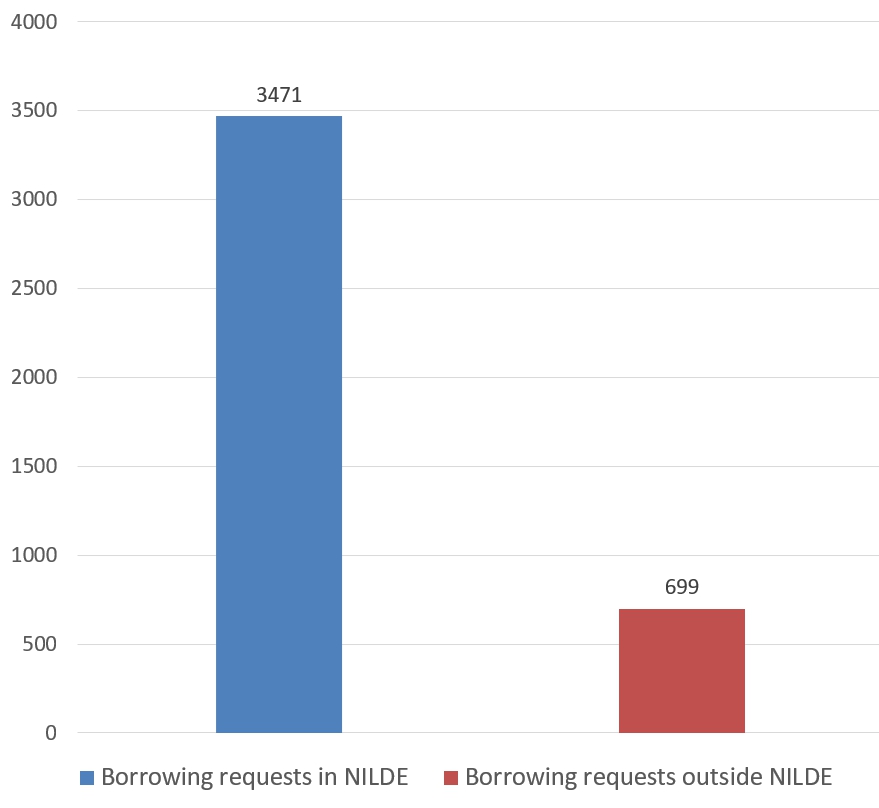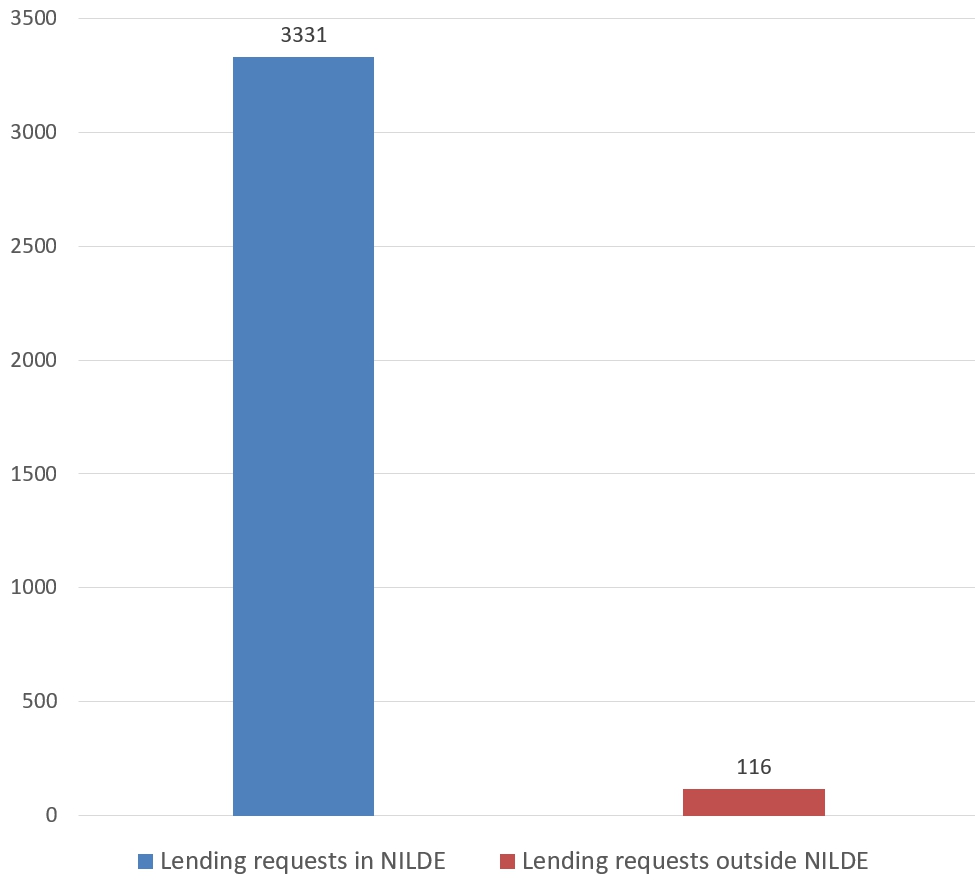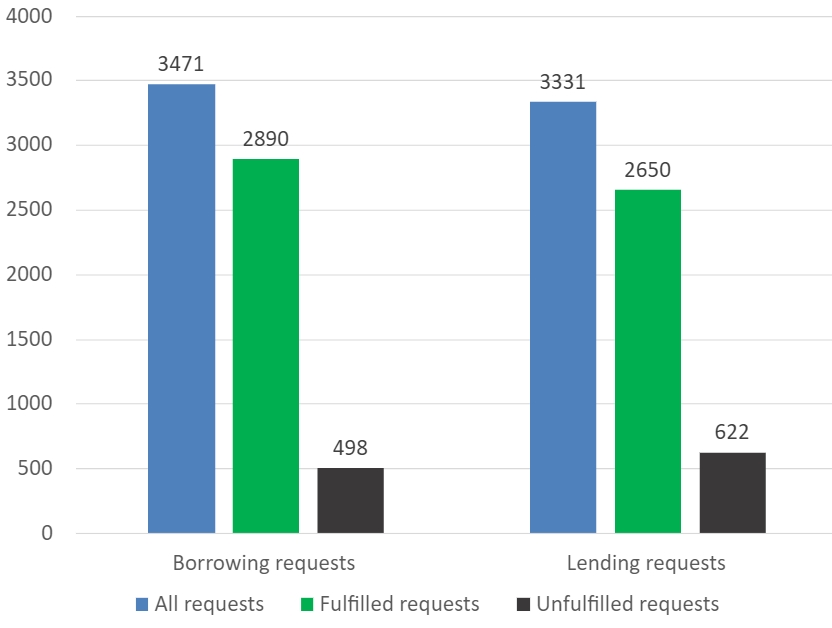The NILDE network and document delivery in Verona University Libraries
Elisabetta Guerra
Abstract
NILDE is a document supply system and a library network used by more than 900 libraries, based on reciprocity. This article describes how this system works and how NILDE libraries cooperate to get reciprocal advantages. The paper also presents the example of Verona University Libraries, which participate in NILDE: the data show that through NILDE the ILL Service of Verona University Libraries can meet almost 90% of the document delivery requests of internal users, and almost all requests of external libraries. In conclusion, it is hoped that the experiences of reciprocity among libraries, even from different countries, can increase to ensure access to information for all users. In our opinion, this service also contributes to the achievement of the objectives of the UN 2030 Agenda for Sustainable Development.
Keywords
Alma; Document delivery; Interlibrary loan; Library cooperation; NILDE; University of Verona
Article
NILDE: a model of cooperation among libraries
NILDE (Network Inter-Library Document Exchange)[1] is both web-based software for document delivery (DD) and a community of libraries sharing bibliographic resources in the spirit of reciprocal collaboration. The NILDE project was implemented in Italy by Biblioteca Dario Nobili, the Bologna National Research Council Library, in 2001. Since then, NILDE has been constantly updated and improved (Mangiaracina et al., 2012). Thanks to the integration with the Italian Catalogue of Periodicals (ACNP)[2] (Brunetti et al., 2015) and with the Collective Catalogue of the Italian National Library Service (OPAC SBN),[3] it is possible to check holdings of many Italian libraries directly in the NILDE software. In 2012, after the integration with the software GTBib-SOD used by Spanish Libraries for document delivery, 33 Spanish libraries joined the NILDE community.
Moreover, it is now possible to integrate NILDE with the main bibliographic databases using the standard protocol ANSI/NISO Z.39.88-2004 OpenURL Framework for Context-Sensitive Services. This protocol makes it possible to connect the most widely used bibliographic databases to NILDE, so that the user gets the automatic compilation of bibliographic citations in the NILDE request form (Mangiaracina et al., 2008). OpenURL also ensures the integration with link resolvers, such as LinkSource and SFX, that can be configured by the library to check immediately if the requested document is in its collections.
NILDE libraries take an active part in the community and subscribe to NILDE rules and regulations. Rules and Regulations define Representing Bodies of NILDE and the commitments of members.[4] The representing bodies of NILDE are the Administrator (National Research Council, Library Dario Nobili), the Assembly (composed of all participating libraries), and the Committee of NILDE Libraries (elected by the Assembly).
NILDE subscription is free for the first year, and requires a very low participation cost in the succeeding years.[5]
The commitments of each library towards the other members are:
- To supply DD services reciprocally.
- To participate in one of the national collective catalogues (ACNP, SBN or REBIUN for Spanish libraries).
- To fulfil document requests in as short a time as possible (average two working days/ maximum five working days).
- To supply documents at no charge, unless there is a strong imbalance between the number of documents requested and supplied.
- To distribute its own requests fairly between all the libraries.
NILDE’s policy, expressed by Rules and Regulations, provides all participating libraries with significant advantages:
- The policy protects the interest of the entire community: by joining national catalogues, libraries commit themselves to supplying a quality service, rather than just using it.
- The policy leads to balance across the entire system.
- The mechanism of requests encourages self-regulation and avoids overloading a small number of libraries.
NILDE libraries pledge themselves to comply with the Copyright Laws in force (Law no. 633 of the 22/4/1941 and successive amendments and supplements)[6] and, where prevailing, to the existing contractual clauses.
NILDE provides a useful tool to check licences before fulfilling a document delivery request for electronic documents: the ALPE licence archive. ALPE is the NILDE “E-journals Licenses Database” and contains the terms related to the document delivery service, extracted from the electronic licensing agreements (negotiated or individual agreements) signed by libraries participating in NILDE (Bessone et al., 2017). Before sending an electronic document, the librarian can interrogate the ALPE licence archive to check if the publisher allows delivery and which are the accepted delivery methods. Many publishers accept delivery through SED, Secure Electronic Delivery. NILDE grants SED through NILDE Digital HardCopy: this is a secure electronic delivery method that permits the sending of documents in pdfs or image formats (jpg, jpeg, gif, tiff, tif, bmp, png) directly from NILDE requests. With NILDE Digital HardCopy every page of the document is converted into an image (png) and the resolution is lowered to 200 dpi. In addition, the document contains a disclaimer that informs the receiving library of legal requirements and of the obligation to deliver a paper copy to the final user (Mangiaracina, 2013).
The NILDE community is now composed of 918 active libraries, of which 71.2% are university libraries, 7.3% research libraries, 8.0% libraries of the National Health Service (Servizio Sanitario Nazionale), 8.7% other type of public libraries and 4.7% not for profit private libraries. Most of them are Italian (877), but there are also 34 Spanish libraries and libraries from Australia, Brazil, Croatia, Luxembourg, Sweden, Switzerland, and Norway.
During 2022, 136,288 documents were exchanged, with a success rate of 84% and an average response time of 0.5 days. The total number of exchanged documents since the creation of NILDE has been of more than 3,000,000.
The NILDE workflow can be described briefly as follows:
- The user makes a request (through “NILDE Users” module or other system).
- The library receives the request (by mail, online form, NILDE Users module or other means, depending on the method the library is using), checks holdings and sends the request to the supplying library (requests and requests statuses are visible in NILDE in the “Borrowing” tab).
- The supplying library receives an alert via email, sees the new request in the “Lending” tab and sends the document through the preferred delivery method: directly in NILDE in “hard copy” format, or other methods.
- The requesting library receives the document: if it is a hard copy, the document is available for seven days in the NILDE server and it must be cancelled just after print.
In accordance with Italian copyright law, only a paper copy can be delivered to the user.
Verona University library system: the advent of Alma and the role of NILDE in interlibrary services
In 2019, within the context of a complete reorganization of Verona University Libraries, the interlibrary services were unified. In the same year, the University library management system switched from Aleph to Alma (Ex Libris).
It was a big change for our libraries. Before Alma, resource sharing was managed separately in the two Central Libraries (Biblioteca Arturo Frinzi for Humanities, Economics and Law areas and Biblioteca Egidio Meneghetti for Medicine, Science, and Technology areas). Resource sharing requests were managed by the two services with different methods and workflows. Both libraries had single subscriptions for NILDE, ACNP and ILL SBN (the ILL service of the Italian National Library Service).[7] Meneghetti library developed an internal program for the management of ILL requests: requests were made by users completing an online form and then librarians put requests in NILDE or sent them via email to partners. Frinzi library users sent DD requests through the “NILDE users” module and ILL requests from the online catalogue (OPAC) of the University libraries.
Thanks to Alma, it is now possible to manage interlibrary requests from a single virtual desk and users can make requests directly in UNIVERSE, the Verona University Libraries discovery tool.[8]
In 2021, Frinzi and Meneghetti merged their profiles in NILDE and ACNP, and they are now identified as “Sistema Bibliotecario Università di Verona” with the ACNP code VR009.
Despite big changes within the organization of the interlibrary services, NILDE has been a point of continuity with the past: Verona University Libraries continue to participate in NILDE, and NILDE is still the major document delivery tool in use.
Some figures: borrowing
In 2022, the Resource Sharing Service of Verona University library system received 5,718 document delivery requests submitted by patrons.
Users make borrowing requests from the portal and discovery tool (UNIVERSE) and the operator finds them in Alma. Then, the operator chooses a partner and sends the requests through NILDE. The request is only sent outside NILDE when the requested material is not available in NILDE libraries.

If we exclude requests related to material owned by University libraries (and therefore that have been cancelled) or requests that for various reasons could not be fulfilled, 4,170 requests were sent to other libraries: 83.2% of them were sent through the NILDE network, and only 16.8% outside NILDE (Fig. 1), that is via email to other Italian or foreign libraries or through other systems (RapidILL, Subito, RSCVD, acnpDoc, ILL SBN)[9] (Table 1). The success rate in NILDE was 85.3% and the average response time was 0.79 days.
| Supplier | Number | Comment |
| NILDE | 3,471 | |
| Unfulfilled | 517 | Cancelled by users, unobtainable document, etc. |
| Italian libraries outside NILDE | 439 | |
| Available online in Verona University | 299 | |
| GIRARTICOLO | 289 | Delivery of documents owned by Verona University Libraries, for internal users |
| Available in Verona University Libraries | 246 | Physical items |
| Open access articles | 193 | |
| Foreign libraries | 122 | |
| RapidILL | 72 | |
| Subito | 47 | |
| acnpDoc | 9 | Document delivery service for ACNP subscribers only |
| RSCVD | 4 | |
| Available in Verona Public Libraries | 4 | |
| Other | 6 | |
| Total document delivery requests in 2022 | 5,718 |
Some figures: lending
The Resource Sharing Service of Verona University library system uses NILDE for nearly all lending requests for articles, book parts and digitized material. The requests are processed separately in Alma and NILDE.[10]
In order to save time, it was decided to process lending requests coming from NILDE directly in NILDE, without registering them in Alma. NILDE statistics are constantly available, so it is not necessary to duplicate requests. Only lending requests that come outside NILDE are created in Alma.
Verona University Libraries holdings are searchable in ACNP. At the end of 2021, we added our e-journals collection in the ACNP catalogue. The result was an immediate increase of requests for electronic documents. Moreover, our catalogue is searchable through Z39-50 protocol, in the “other catalogues” section of OPAC SBN.[11]

In 2022, Verona University Libraries received 3,331 lending requests from NILDE partner libraries; 59 of them were cancelled by requesting libraries before fulfilment, 622 went unfulfilled and 2,650 of them were fulfilled (Fig. 2). The success rate was 81% and the average response time was 0.3 days. Among the reasons for unfulfilment were the unavailability of paper/electronic documents, but also the impossibility of sending the document due to electronic licensing restrictions. Only 116 lending requests were processed outside NILDE: 93 in Italy and 23 abroad.
All in all, as the 2022 figures show (Fig. 3), there is a balance in the total number of borrowing and lending requests processed in NILDE at Verona University Libraries.[12]

A few thoughts in conclusion
To conclude, we would like to share some reflections on resource sharing and, in particular, on the great opportunities arising from collaboration among libraries in the framework of mutual exchange and reciprocity. NILDE is an example of how the joint, cooperative and not for profit engagement of libraries can lead to excellent results. We believe that resource sharing is, by definition, an important tool for guaranteeing access to information. It is one of the pillars on which we, as libraries, can build the foundations for achieving UN 2030 Agenda for Sustainable Development Goals.
Access to quality information can play fundamental role in achieving the 17 goals of the Agenda. According to the IFLA Statement on Evidence for Sustainable Development (International Federation of Library Associations and Institutions, 2022):
Libraries represent an essential link in the chain between those who are gathering or producing evidence, and those who should be using it to take decisions. They fulfil a number of roles, including supporting research, and managing data and dissemination (including through supporting the development of technical possibilities for this), enabling the sharing of and access to information, the effective packaging of information for decision-makers, teaching the skills needed for information access and use, and long-term preservation in the service of future research and accountability.
Resource Sharing is one of the key activities of Libraries in this process, as it ensures “sharing of and access to information”, when this information is not available in the user’s library. Sharing resources in the form of free reciprocity allows us to achieve these objectives at low cost, and provides mutual help in critical moments, such as in the case of the RSCVD project in 2020 during the COVID-19 pandemic.
The hope is that reciprocity will increasingly cross national borders, particularly among European libraries. The wish is that copyright regulations will take into account the need to disseminate information in the fields of education and research and will be updated as new technologies become available.
Particular attention should be paid to licences for the use of electronic resources which too often do not allow document delivery outside the country of origin. The impossibility of sharing resources caused by licence restrictions is particularly limiting when it involves higher education and research institutions, even when they are involved in common research projects or educational programs.
Bibliography
Bernardini, E., Colombo, G., Lomba, C., Mangiaracina, S. Merlini, F., & Secinaro, E. (2017). A NILDE survey on International ILL Exchanges: results and considerations. ILDS – 15th Interlending and Document Supply Conference. No Library Left Behind: Cross-Border Resource Sharing (Paris, France, 04-06 October 2017). Proceedings, IFLA Document Delivery and Resource Sharing Section. https://nildeworld.bo.cnr.it/it/node/488
Bessone, F., Colombo, G., De Carolis, E., Filippucci, G., Garbolino, L., Gasbarro, E., Mangiaracina, S., Russo, O., Tamburini, E., & Tugnoli, A. (2017). To lend or not to lend? With ALPE it is easier! An Italian cooperative system for checking ILL permitted uses in e-resource licenses. ILDS – 15th Interlending and Document Supply Conference. No Library Left Behind: Cross-Border Resource Sharing (Paris, France, 04-06 October 2017). Proceedings, IFLA Document Delivery and Resource Sharing Section. https://nildeworld.bo.cnr.it/it/node/489
Brunetti, F., Bonora, O., & Filippucci, G. (2015). ACNP and NILDE: Essential tools for access to scientific research. In A. Holl, S. Lesteven, D. Dietrich. & A. Gasperini (Eds.), Library and Information Services in Astronomy VII: Open Science at the Frontiers of Librarianship (pp. 275-283). Astronomical Society of the Pacific. http://www.aspbooks.org/a/volumes/table_of_contents/?book_id=560
IFLA Document Delivery and Resource Sharing Section. (2012). Guidelines for Best Practice in Interlibrary Loan and Document Delivery. International Federation of Library Associations and Institutions. https://repository.ifla.org/handle/123456789/705
International Federation of Library Associations and Institutions. (2022). IFLA Statement on Evidence for Sustainable Development. https://repository.ifla.org/handle/123456789/2191
Lomba, C., Marzocchi, S., & Mazza, D. (2023). HERMES, an international project on free digital resource sharing. In F. Renaville & F. Prosmans (Eds.), Beyond the Library Collections: Proceedings of the 2022 Erasmus Staff Training Week at ULiège Library. ULiège Library. https://doi.org/10.25518/978-2-87019-313-6
Mangiaracina, S. (2013). NILDE technical description: Secure Electronic Document Delivery and Digital Hard-Copy. https://nildeworld.bo.cnr.it/en/pub/nilde-technical-description-secure-electronic-document-delivery-and-digital-hard-copy
Mangiaracina, S., & Tugnoli, A. (2012). NILDE reloaded: a new system open to international interlibrary loan. Interlending & Document Supply, 40(2), 88–92. https://doi.org/10.1108/02641611211239551
Mangiaracina, S., Zaetta, M., De Matteis, D., Tugnoli, A., Beghelli, E., & Tenaglia, G. (2008). NILDE: developing a new generation tool for document delivery in Italy. Interlending & Document Supply, 36(3), 167-177. https://doi.org/10.1108/02641610810897908
- https://nilde.bo.cnr.it ↵
- https://acnpsearch.unibo.it ↵
- https://opac.sbn.it/web/opacsbn ↵
- https://nildeworld.bo.cnr.it/en/content/rules_and_regulations ↵
- https://nilde.bo.cnr.it/subscriptions.php?inc=economic_conditions ↵
- https://www.gazzettaufficiale.it/eli/id/1941/07/16/041U0633/sg ↵
- https://www.iccu.sbn.it/en/interlibrary-loan-and-document-delivery-ill-sbn/index.html ↵
- https://universe.univr.it ↵
- RapidILL is an Ex Libris interlibrary loan solution that was tested within a trial in 2021/2022. Subito is the ILL service of a network of 40 academic libraries with its headquarters in Berlin. RSCVD is the IFLA resource sharing project developed during COVID-19 (Lomba et al., 2023). acnpDoc is a document delivery service available for ACNP subscribers. ↵
- The integration between NILDE and Alma is not yet available, but it is an ongoing project. The resource sharing working group within ITALE, the Italian association of Ex Libris users, is collaborating with the NILDE team to find solutions for a possible integration of the two systems. See: https://itale.igelu.org/gruppo-di-lavoro-resource-sharing. In March 2023 however, Luisella Consumi, Nazareno Bedini, and Francesca Mocchi from the ITALE working group launched an app called Nilde Openurl within the Alma Cloud App centre. This app makes it possible to send an Alma RS borrowing request to NILDE via openurl. See: https://developers.exlibrisgroup.com/appcenter/nilde-openurl/. ↵
- https://opac.sbn.it/cataloghi-z39.50-in-rete ↵
- The total number of requests ("All requests" in the chart) includes also requests that were cancelled by requesting libraries before the fulfilment process starts. ↵

